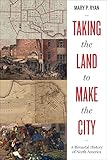Taking the Land to Make the City : A Bicoastal History of North America / Mary P. Ryan.
Material type: TextSeries: Lateral Exchanges: Architecture, Urban Development, and Transnational PracticesPublisher: Austin : University of Texas Press, [2021]Copyright date: ©2019Description: 1 online resource (448 p.) : 16 color photos, 60 b&w photosContent type:
TextSeries: Lateral Exchanges: Architecture, Urban Development, and Transnational PracticesPublisher: Austin : University of Texas Press, [2021]Copyright date: ©2019Description: 1 online resource (448 p.) : 16 color photos, 60 b&w photosContent type: - 9781477317846
- 979.4/6104 23
- F869.S357 R93 2019
- online - DeGruyter
| Item type | Current library | Call number | URL | Status | Notes | Barcode | |
|---|---|---|---|---|---|---|---|
 eBook
eBook
|
Biblioteca "Angelicum" Pont. Univ. S.Tommaso d'Aquino Nuvola online | online - DeGruyter (Browse shelf(Opens below)) | Online access | Not for loan (Accesso limitato) | Accesso per gli utenti autorizzati / Access for authorized users | (dgr)9781477317846 |
Browsing Biblioteca "Angelicum" Pont. Univ. S.Tommaso d'Aquino shelves, Shelving location: Nuvola online Close shelf browser (Hides shelf browser)

|

|

|

|

|

|

|
||
| online - DeGruyter Sí, Ella Puede! : The Rhetorical Legacy of Dolores Huerta and the United Farm Workers / | online - DeGruyter Beyoncé in Formation : Remixing Black Feminism / | online - DeGruyter The Enlightened Army / | online - DeGruyter Taking the Land to Make the City : A Bicoastal History of North America / | online - DeGruyter Houston Rap Tapes : An Oral History of Bayou City Hip-Hop / | online - DeGruyter Night Moves / | online - DeGruyter Violence and Naming : On Mexico and the Promise of Literature / |
Frontmatter -- CONTENTS -- INTRODUCTION -- Part I TAKING THE LAND -- Chapter 1 BEFORE THE LAND WAS TAKEN -- Chapter 2 THE BRITISH AND THE AMERICANS TAKE THE CHESAPEAKE -- Chapter 3 THE LAND OF SAN FRANCISCO BAY Cleared but Not Taken -- Part II MAKING THE MUNICIPALITY The City and the Pueblo -- Chapter 4 ERECTING BALTIMORE INTO A CITY Democracy as Urban Space, 1796–1819 -- Chapter 5 SHAPING THE SPACES OF CALIFORNIA Ranchos, Plazas, and Pueblos, 1821–1846 -- Part III MAKING THE MODERN CAPITALIST CITY -- Chapter 6 MAKING BALTIMORE A MODERN CITY, 1828–1854 -- Chapter 7 THE CAPITALIST “PUEBLO” Selling San Francisco, 1847–1856 -- Part IV THESE UNITED CITIES -- Chapter 8 BALTIMORE, SAN FRANCISCO, AND THE CIVIL WAR -- EPILOGUE -- ACKNOWLEDGMENTS -- NOTES -- INDEX
restricted access online access with authorization star
http://purl.org/coar/access_right/c_16ec
The history of the United States is often told as a movement westward, beginning at the Atlantic coast and following farmers across the continent. But cities played an equally important role in the country’s formation. Towns sprung up along the Pacific as well as the Atlantic, as Spaniards and Englishmen took Indian land and converted it into private property. In this reworking of early American history, Mary P. Ryan shows how cities—specifically San Francisco and Baltimore—were essential parties to the creation of the republics of the United States and Mexico. Baltimore and San Francisco share common roots as early trading centers whose coastal locations immersed them in an international circulation of goods and ideas. Ryan traces their beginnings back to the first human habitation of each area, showing how the juggernaut toward capitalism and nation-building could not commence until Europeans had taken the land for city building. She then recounts how Mexican ayuntamientos and Anglo American city councils pioneered a prescient form of municipal sovereignty that served as both a crucible for democracy and a handmaid of capitalism. Moving into the nineteenth century, Ryan shows how the citizens of Baltimore and San Francisco molded landscape forms associated with the modern city: the gridded downtown, rudimentary streetcar suburbs, and outlying great parks. This history culminates in the era of the Civil War when the economic engines of cities helped forge the East and the West into one nation.
Mode of access: Internet via World Wide Web.
In English.
Description based on online resource; title from PDF title page (publisher's Web site, viewed 26. Apr 2022)


